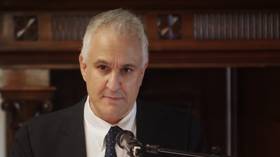We can’t even freely debate Islam without being accused of Islamophobia. British universities are becoming cancel-culture prisons

An Oxford University provost who was previously chair of the UK’s Equality and Human Rights Commission this week apologised to students for having allowed his college to host a Christian conference.
Yes, you read that right: in 2021, a college being used as the venue for a Christian event is enough to cause offence.
The week-long conference at Worcester College was held during the summer break, when students were on vacation. One of the speakers at the event – which was sponsored by the evangelical conservative advocacy organization Christian Concern – was Mike Davidson, the CEO of the Core Issues Trust and X-Out-Loud, which offer psychotherapy and support to those who experience unwanted homosexual behaviour and feelings. Davidson is reported to practise controversial ‘conversion therapy’ – a claim he rejects.
Plenty to be concerned about there, you might think. But Davidson’s views on homosexuality were not the only cause of the furore that led to provost David Isaac’s apology – the topic of the conference’s closing session, titled ‘The Nature of Islam’, was also considered offensive. Students described it as “hateful and invalidating”, denouncing it as “Islamophobic”, and Isaac swiftly issued a grovelling public apology. He described the decision to host the event as “a serious failure that has caused significant distress to students”, and reportedly mounted an investigation.
You might expect a respected educational institution such as Oxford, a champion of intellectual rigour and free speech, to have stood its ground. That it didn’t is shocking enough. But what’s even more flabbergasting is that it has been alleged that none of the students who complained, or indeed Mr Isaacs himself, was in attendance at the seminar in question. It could therefore be argued that they likely made a sweeping assumption as to what was said about Islam during the event – and that’s an example of cancel culture at its worst.
An ideologically driven approach to others’ views such as this doesn’t just restrict free speech, but also encourages public shaming, the intimidation of institutions and individuals, and even concerted attempts to destroy the livelihoods of ‘wrong-thinkers’. And that is exactly what happened at Worcester College, where simply discussing, questioning or – God forbid – criticising Islam is seemingly not allowed, and will be shut down by the sensitivity mobs who deem such topics to be off limits.
A discussion of religion shouldn’t cause “distress”. A university is supposed to be an arena where learning is gained through healthy debate with people with whom we might sometimes disagree. That’s how we challenge and expand our independent thinking. Depriving speakers of the chance of discussing the Islamic faith on campus is a slippery slope to intolerance, and, were it to be repeated in an academic course, could even alienate Muslim students. If cancel culture is allowed to continue stifling discussion in this way, it will ultimately make students less smart. That there might soon be a total lack of intellectual pushback is a gloomy prospect that should worry us all.
If our ideas are worth listening to, we must be confident enough to debate them, rather than seeking to erase views that aren’t the same as ours. Most Muslims, and indeed Islam itself, encourage such debates, and the Oxford Union has previously hosted plenty of discussions about aspects of the faith. We must all be able to talk freely about Islam without being accused of Islamophobia. If we don’t, we risk perpetuating misconceptions and stereotypes – and that will cause far more harm to Muslims in the long run than free speech. Pressuring guest speakers into silence and demanding apologies serves only to stir up divisions between communities and stops us finding common ground through interfaith dialogue.
There was nothing wrong with Worcester College hosting a Christian event, just as there’d be nothing wrong with it holding an Islamic conference that debated the Christian school of thought. This is how we learn from and come to understand each other’s belief systems. However, the cultural phenomenon of feelings-based politics has completely engulfed our universities, which have become hotbeds of political correctness and wokeness.
Academia has been left-leaning for generations, and those who preside over such environments enshrine in them their values. Nicholas Nassim Taleb discusses this phenomenon in his book ‘Skin in the Game: Hidden Asymmetries in Daily Life’. It takes only a tiny minority of people, he says – just 3 to 4% – to change the very direction of institutions and thereby societies. Taleb calls this “minority rule”.
Also on rt.com Why not break up the Oxbridge universities? They help fuel the regional, educational, and class divides that blight BritainIt’s therefore not surprising that those who have cultural dominance feel emboldened to accuse others of, as in this instance, Islamophobia. Eventually, everything deemed a threat to sacred left values will be seen as “hateful” and “invalidating”. The result? Universities become brain-washing factories churning out graduates who all think the same, acceptable way.
Academic freedom in universities today has ceased to exist. Polarised side-takers on campus, obsessed with dividing themselves and others into ‘victim groups’ and ‘oppressor groups’, are turning these institutions into cancel-culture prisons where self-censorship is seen as the safest course of action – and that should worry us all, whatever our creed.
Think your friends would be interested? Share this story!
The statements, views and opinions expressed in this column are solely those of the author and do not necessarily represent those of RT.
















